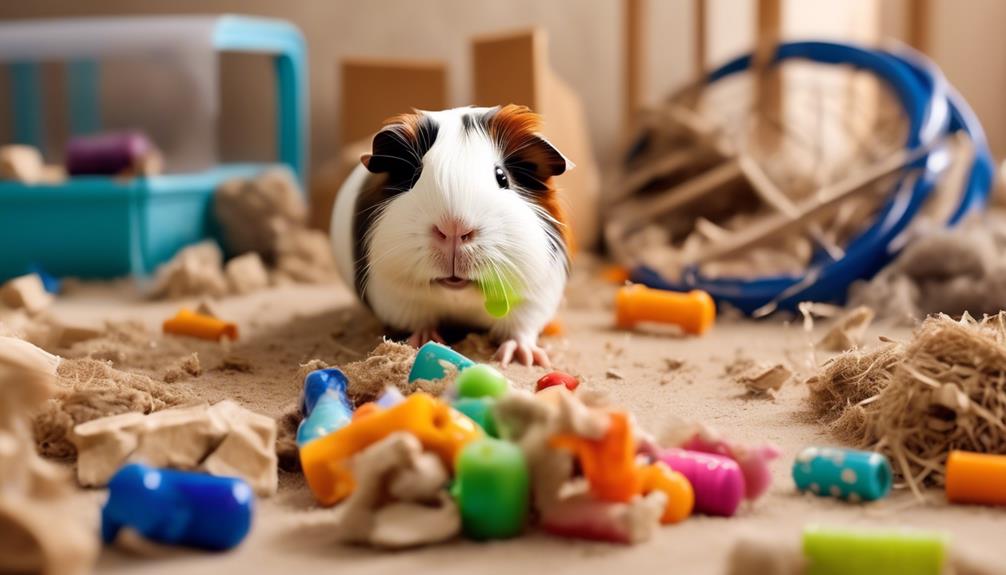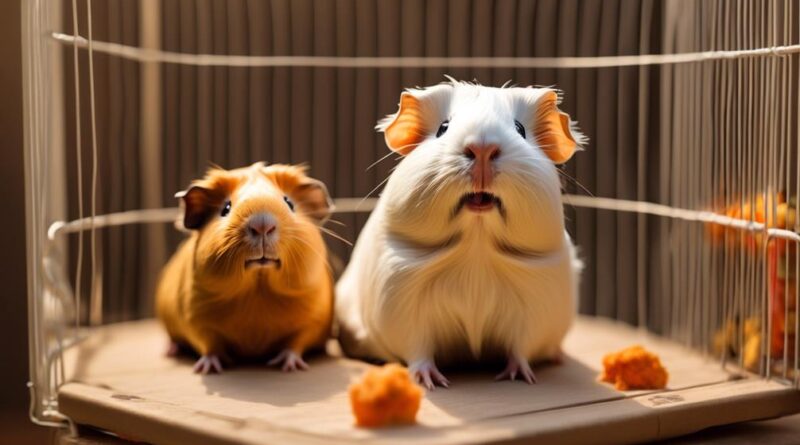7 Tips to Understand Your Guinea Pig's Odd Behavior
Have you ever noticed your guinea pig exhibiting odd behavior that leaves you scratching your head? Understanding your furry friend's actions can be a bit perplexing at times, but fear not, as we're here to help unravel the mystery.
From deciphering unusual vocalizations to interpreting body language, there are several tips to consider when it comes to comprehending your guinea pig's behavior.
So, if you've ever wondered why your guinea pig acts a certain way, or if you're simply looking to deepen your bond with your pet, stick around to uncover some valuable insights into the world of guinea pig behavior.
Signs of Stress in Guinea Pigs
If your guinea pig is experiencing stress, they may exhibit various behaviors and physical signs that indicate their discomfort. Identifying environmental stressors is crucial in understanding and addressing your guinea pig's well-being.
Environmental stressors can include loud noises, excessive handling, sudden changes in their living space, or the presence of predators, such as cats or dogs. These stressors can cause your guinea pig to feel anxious, leading to physical symptoms that are important to recognize.
Recognizing physical symptoms is key to identifying stress in guinea pigs. Some common physical signs of stress include excessive grooming or hair loss, changes in appetite, weight loss, or hunched posture.
If your guinea pig is experiencing stress, they may also exhibit behaviors such as teeth chattering, excessive hiding, or increased aggression. It's important to monitor your guinea pig's behavior and physical well-being regularly to catch any signs of stress early on.
Common Causes of Aggression
Identifying the common causes of aggression in guinea pigs is essential for understanding and addressing their well-being, especially when they exhibit behaviors such as teeth chattering, excessive hiding, or increased aggression due to environmental stressors. Aggression triggers in guinea pigs can include factors such as feeling threatened, territorial disputes, or fear. Understanding these triggers can help in implementing behavior modification techniques to address and reduce aggression in your guinea pig.
Socialization plays a significant role in guinea pig behavior. When guinea pigs aren't properly socialized, they may exhibit aggression towards other guinea pigs or even humans. It's essential to introduce guinea pigs to each other gradually, allowing them to establish a dominance hierarchy. This can help minimize aggressive behaviors stemming from territorial disputes or dominance struggles.
Environmental stressors, such as loud noises, sudden movements, or inadequate living space, can also lead to increased aggression in guinea pigs. It's crucial to create a safe and comfortable environment for your guinea pig, providing them with hiding spots and enough space to move around freely.
Understanding Unusual Vocalizations
Have you ever wondered what your guinea pig's unusual vocalizations might mean? Understanding odd chirping and deciphering squeak language can provide valuable insight into your guinea pig's behavior. Guinea pigs are known for their wide range of vocalizations, from low rumbles to high-pitched squeaks, each carrying its own meaning. When your guinea pig makes unusual vocalizations, it could be trying to communicate a variety of things, and it's essential to pay attention to these sounds to better understand your pet's needs.
Odd chirping or high-pitched squeaks from your guinea pig can indicate excitement or anticipation. For instance, if you're preparing their meal, they may emit these sounds as a way of expressing eagerness. Additionally, unusual vocalizations could also indicate discomfort or pain. If your guinea pig is making continuous high-pitched sounds, it might be experiencing some form of distress, and it's crucial to monitor their behavior and seek veterinary attention if necessary.
Deciphering squeak language is an ongoing process that requires close observation and familiarity with your guinea pig's unique vocalizations. It's important to note that each guinea pig may have its own variations in vocal expressions, so taking the time to understand your pet's specific sounds is key to fostering a strong bond and ensuring their well-being.
Decoding Strange Eating Habits
When observing your guinea pig's behavior, understanding their unusual vocalizations can lead to insights about their well-being, and similarly, decoding their strange eating habits can provide further understanding of their overall health and needs.
Guinea pigs, like humans, can have unique food preferences. If you notice your guinea pig exhibiting picky eating habits, pay attention to their food preferences. They may be avoiding certain foods due to taste, texture, or smell, or it could be a sign of digestive issues. It's essential to monitor their unusual appetite, as sudden changes in eating habits can be an indication of an underlying health problem.
Furthermore, be mindful of any digestive issues your guinea pig may experience, such as diarrhea or constipation. These issues can be linked to their eating habits and the foods they consume. Ensure that your guinea pig has a balanced diet, including hay, fresh vegetables, and guinea pig pellets, to prevent digestive problems.
Observe your pet's eating habits closely, as any sudden or prolonged change in appetite or food consumption could be a cause for concern.
Interpreting Body Language
Watch for subtle cues in your guinea pig's body language to better understand their feelings and needs. Understanding communication through gestures is crucial in deciphering what your guinea pig is trying to express.
When your guinea pig feels content and relaxed, they may stretch out their body, lie down comfortably, and make soft, rhythmic noises. On the contrary, if they're feeling anxious or threatened, they may freeze, flatten their bodies close to the ground, and remain silent. If your guinea pig raises its head and stands on its hind legs, it could be a sign of curiosity or a desire to explore its surroundings. Pay attention to their ears as well; if they're pricked up, your guinea pig is likely alert and attentive, while flattened ears could indicate fear or discomfort.
Additionally, interpreting gestures such as teeth chattering, which is often accompanied by raised hair along the back, suggests aggression or annoyance. On the other hand, gentle teeth chattering can indicate contentment or pleasure, particularly when being petted. Observing your guinea pig's body language during interactions with other guinea pigs or with you can provide valuable insights into their emotional state.
Coping With Sudden Shyness
If your guinea pig suddenly exhibits shyness, it's important to consider potential triggers and provide a calm and secure environment for them to feel safe and comfortable. Building trust with your guinea pig is crucial in helping them overcome sudden shyness. Spend time near their enclosure, talking to them softly, and offering treats to create a positive association. Sit near them and offer your hand for them to sniff, allowing them to become familiar with your scent and presence. This gradual approach can help in building trust and reducing shyness.
Creating comfort for your guinea pig is essential in coping with sudden shyness. Ensure that their living space is quiet and free from sudden loud noises that could startle them. Provide hiding spots such as enclosed areas or tunnels within their enclosure where they can retreat if they feel overwhelmed. Additionally, placing familiar items like their favorite toys or bedding can offer a sense of security.
Gently interacting with your guinea pig during their shy moments can also aid in overcoming their shyness. Avoid forcing them out of their hiding spot or picking them up if they seem reluctant. Instead, sit or lie down near them and speak softly to reassure them. Offering treats and gentle petting when they feel comfortable can gradually help them regain confidence.
Addressing Excessive Chewing

To address excessive chewing in your guinea pig, provide a variety of safe chew toys to satisfy their natural urge to gnaw and keep their teeth healthy. Preventing excessive chewing can be achieved by offering alternatives to destructive behavior. Guinea pigs often chew excessively due to boredom or to wear down their teeth, so redirecting destructive behavior towards appropriate chew toys is essential. It's crucial to ensure that the chew toys are safe and suitable for guinea pigs. Wooden blocks and untreated wicker baskets are excellent options as they provide a satisfying chewing experience while being safe for your pet.
Another effective way to address excessive chewing is by offering hay. Guinea pigs love to chew on hay, and it also helps in wearing down their teeth. Placing hay in a hayrack or a designated hay feeder can keep your guinea pig occupied and prevent them from turning to destructive chewing. Additionally, incorporating cardboard tubes and tunnels into their enclosure can provide mental stimulation and an outlet for their chewing instincts.
When redirecting destructive behavior, it's important to observe your guinea pig's preferences. Some may enjoy gnawing on wooden toys, while others may prefer hay or cardboard. By providing a variety of safe chew toys, you can prevent excessive chewing and keep your guinea pig mentally engaged and physically healthy.
Dealing With Unusual Sleeping Patterns
Guinea pigs may exhibit unusual sleeping patterns, which can be concerning for pet owners. Understanding their sleep patterns is crucial in ensuring their well-being.
Typically, guinea pigs are crepuscular, meaning they're most active during dawn and dusk. They may take short naps throughout the day and night, but if you notice prolonged periods of wakefulness or irregular sleep cycles, it could be a sign of underlying issues such as stress, discomfort, or even illness.
Dealing with insomnia in guinea pigs requires a keen observation of their environment and habits. Ensure that their cage is located in a quiet, dimly lit area to mimic their natural habitat. Loud noises, bright lights, or disruptions during their active periods can disrupt their sleep. Providing cozy hiding spots and comfortable bedding can also promote a sense of security, reducing stress and promoting better sleep. Additionally, maintaining a consistent daily routine for feeding, playtime, and handling can help regulate their sleep-wake cycle.
If your guinea pig continues to display unusual sleeping patterns despite environmental adjustments, it's essential to seek guidance from a veterinarian specializing in exotic pets. They can conduct a thorough examination to rule out any health issues contributing to their insomnia.
Frequently Asked Questions
How Can I Train My Guinea Pig to Do Tricks or Respond to Commands?
To train your guinea pig to do tricks or respond to commands, try clicker training for positive reinforcement. Target training can also be effective. Use small, tasty treats and patience to encourage and reward desired behaviors.
Is It Normal for My Guinea Pig to Be Afraid of Certain Objects or People?
It's normal for your guinea pig to be afraid of certain objects or people. Overcoming fears is possible through gradual exposure and positive reinforcement. Building confidence and fear management are key to helping your guinea pig feel secure.
What Are Some Ways to Bond With My Guinea Pig and Build Trust?
To build trust and encourage interaction with your guinea pig, spend quality time with them daily, offer treats, and speak softly. Gently handle and pet your pig, allowing them to come to you, creating a strong bond.
Can Guinea Pigs Experience Separation Anxiety When Left Alone?
Yes, guinea pigs can experience separation anxiety when left alone. Understanding separation anxiety and dealing with loneliness in guinea pigs is important. Providing companionship, toys, and a stimulating environment can help alleviate their distress.
Are There Any Tips for Introducing a New Guinea Pig to an Existing Guinea Pig?
When introducing guinea pigs, start by placing their cages near each other to help them get used to the new scent. After a few days, let them meet in a neutral space to bond and socialize for companionship.
Conclusion
Understanding your guinea pig's odd behavior is key to providing them with the best care and environment. By recognizing signs of stress, aggression, vocalizations, eating habits, body language, shyness, chewing, and sleeping patterns, you can address any issues and ensure your pet is happy and healthy.
Paying attention to these behaviors and taking the time to understand them will strengthen your bond with your guinea pig and make for a happier relationship.
